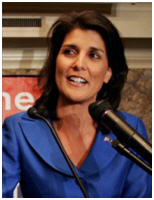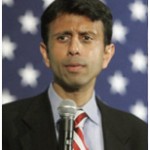By Kollengode S. Venkataraman e-mail:Â thepatrika@aol.com
In the 2010 elections rightwing mouth pieces (Fox, Rush Limbaugh, Sean Hannity and others) enthusiastically endorsed two “ethnic†candidates, Marco Rubio in Florida and Nikki Haley in South Carolina. Rubio, the speaker of the Florida Assembly, set his sights as the US senator; Nikki Haley, a member of South Carolina state assembly, pursued the governorship in South Carolina. Both were the darlings of the rightwing Tea Partiers. Finally, the GOP seems to recognize the changed social fabric of the US. Better late than never.
 Haley, born to Sikh immigrant parents from India, was Namrata Nikki Randhawa. After her marriage and after entering electoral politics, she dropped the very Indian “Namrata†and “Randhawa†in her name and became Nikki Haley.
Haley, born to Sikh immigrant parents from India, was Namrata Nikki Randhawa. After her marriage and after entering electoral politics, she dropped the very Indian “Namrata†and “Randhawa†in her name and became Nikki Haley.
Rubio and Haley ran disciplined campaigns, and thanks to the anti-Democratic sentiment, they won big. They deserve our admiration.
Even as both represented the minorities in American electoral politics, their journeys were sharply different. Rubio is the son of Cuban exiles and was born in Miami, Florida and is fluent in Spanish. He grew up in what can be called a working class American home — his father was a bartender and his mother worked as a hotel housekeeper in Las Vegas, Nevada. After  attending Santa Fe Community College, he earned degrees in political science 1993 and law degree 1996 from universities in Florida. Rubio served as a City Commissioner for West Miami before elected to the Florida House of Representatives in 2000. In November 2006, he became the Speaker of the Florida State House for 2006-08.
attending Santa Fe Community College, he earned degrees in political science 1993 and law degree 1996 from universities in Florida. Rubio served as a City Commissioner for West Miami before elected to the Florida House of Representatives in 2000. In November 2006, he became the Speaker of the Florida State House for 2006-08.
Haley, though a minority in the ethnic sense, belongs to a “privileged†minority in the American context. She is like many children born to professional Indian immigrants. Born to college educated Indian parents – her father was a professor in chemistry — Haley went to Clemson University, earned a degree in accounting, and worked as an accounting supervisor in Charlotte, NC. Her mother was an entrepreneur. According to her campaign, Haley worked in her mother’s garment business and built it into a multimillion dollar enterprise. She was active in many business and social organizations such as chambers of commerce, Rotary Club…
The victory speeches the two delivered and the campaign they ran sharply brought out the contrasts in their journeys to where they got. Remember, political campaigns and rallies are heavily scripted and stick to well-tested talking points. Campaign managers spend lot of time and effort to manage the “optics†of the event captured on video cameras.  Below are the video clips of the victory speeches of Rubio and Haley in full. (Note: if you want to watch their victory speeches, copy the web address and paste it at your URL site and hit return.)
1. Haley’s Speech here: www.youtube.com/watch?v=qBrO7VmB5fM
2.  Rubio’s Speech here: www2.counton2.com/news/2010/nov/03/governor-elect-nikki-haleys-victory-speech-ar-1045771/
Rubio, proud of his status as the son of Cuban exiles, made passionate references to his father and mother in his victory speech. He reaffirmed his identity, as the one belonging to “the community of exiles,†and that, he, Marco Rubio, always will be the son of [Cuban] exiles.†He also talked about his bartender father and housemaid mother.
In Haley’s bland victory speech, there was no reference to her roots, only passing references to her parents as she thanked her and her husband’s parents and brothers.
Earlier in the campaign, Haley told “I was born and raised with the Sikh faith, my husband and I were married in the Methodist Church, our children… … have been baptized in the Methodist Church, and currently we attend both,†she said. But soon, she was running away from her Sikh identity when she did not even acknowledge that she and her husband, Michael Haley, were married in two ceremonies, one Sikh and the other at a Methodist church.
Earlier in her political life, Haley was comfortable publicly embracing both religions. But as the campaign progressed, she talked of having “converted to Christianity†before her wedding in 1996, when she was baptized as a Methodist. To a question “Is Nikki a Christian?†in her website, she also changed the wording in the answer: From an answer that references to “Almighty Godâ€, she changed it to one that references “Christ.â€
The contrast between Rubio and Haley is striking. As both climbed higher on the political ladder, Rubio was quite comfortable about his roots. Haley, uncomfortable with her ethnic identity, was running away from her roots. Haley is not unique in this. Bobby Jindal (Piyush,  before he became Bobby) set the trend when he ran for the office of the governor of Louisiana. When Jindal as governor was invited to the White House Diwali function — which has now lost all its religious significance — he did not show up. Probably because of the bad optics of video clips filling the Louisiana airwaves in election commercials showing a very brown Jindal in a Indian “Hindu†function in the midst of other brown Indians. That will not sit well in the deeply “Southern†Louisiana.
before he became Bobby) set the trend when he ran for the office of the governor of Louisiana. When Jindal as governor was invited to the White House Diwali function — which has now lost all its religious significance — he did not show up. Probably because of the bad optics of video clips filling the Louisiana airwaves in election commercials showing a very brown Jindal in a Indian “Hindu†function in the midst of other brown Indians. That will not sit well in the deeply “Southern†Louisiana.
In the electoral politics for state-wide offices in the US, multiculturalism and diversity is still a novelty.
In Jindal’s defence, Jindal, a Brown University graduate in biology, in his anxiety to get elected as the governor of Louisiana, was also running away from Darwin’s Natural Selection and embraced the Judeo-Christian concepts of creation in which the universe is only 6,000 years old, give or take a few centuries. OK, All is fair in war, love, and in elections.
Jindal and Haley running away from their roots reminded me of David Chappelle’s wickedly witty, cynical skit (video reference: www.youtube.com/watch?v=wITchV88Gjk&feature=related ) (Note: copy the web address and paste it at your URL site and hit return to go to the YouTube clip. This is wicked and hilarious.)
In the skit, a congenitally blind Black man, raised by racist whites since his childhood, behaves more White than the whites themselves. He hates Blacks more than the Whites themselves.
The discomfort of elected officials of Indian origin in the US such as Nikki Haley and Bobby Jindal with their own cultural identity is baffling. The track record of nearly three million Indian-Americans is nothing to be embarrassed about. They establish themselves on their individual strengths alone as small business people, healthcare professionals, engineers, IT professionals, lawyers, researchers, depending only on their education and professional skills. And yes, also as cab drivers, hotel employees, restaurant workers, and airport employees pushing wheelchairs carrying physically disabled passengers, with their sweat equities.   ♦
